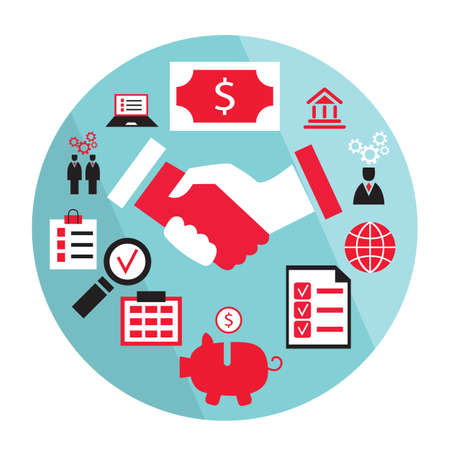1. Introduction: The Importance of Tracking Expenses
Managing your money effectively starts with understanding where it’s going. Tracking expenses is one of the most fundamental steps toward financial stability and achieving long-term goals. Without a clear picture of your spending habits, it’s easy to overspend, accumulate debt, or struggle to save for important milestones like buying a home, starting a business, or retiring comfortably.
Why Expense Tracking Matters
Many people underestimate how small daily purchases add up over time. A few dollars spent on coffee, dining out, or subscriptions might seem insignificant, but they can significantly impact your budget when unchecked. Keeping track of every expense helps you:
- Identify unnecessary spending habits
- Create a realistic budget based on actual expenses
- Avoid running out of money before your next paycheck
- Save more effectively for future goals
- Reduce financial stress and improve overall well-being
How Expense Tracking Supports Financial Goals
If you have financial goals like paying off debt, building an emergency fund, or investing for retirement, tracking expenses is essential. It allows you to adjust your spending patterns to align with your priorities and ensures that your hard-earned money is working toward what truly matters.
(1) Budgeting Made Easier
A well-maintained record of expenses makes budgeting straightforward. You’ll know exactly how much you need for essentials like rent, utilities, groceries, and transportation while identifying areas where you can cut back.
(2) Avoiding Debt Accumulation
Without tracking expenses, it’s easy to overspend and rely on credit cards to cover shortfalls. Monitoring spending in real-time prevents unnecessary debt and helps you stay within your means.
(3) Planning for Big Purchases
Whether youre saving for a vacation, a new car, or home improvements, knowing where your money goes helps you allocate funds toward big-ticket items without disrupting your financial stability.
The Cost of Not Tracking Expenses
If you’re not keeping tabs on where your money is going, you may face challenges such as:
| Problem | Impact |
|---|---|
| Uncontrolled Spending | Difficult to manage monthly bills and savings. |
| Lack of Savings | No financial cushion for emergencies or future plans. |
| Debt Build-up | Increased reliance on loans and credit cards. |
| Poor Financial Awareness | No clear understanding of income versus expenses. |
The good news is that tracking expenses doesn’t have to be complicated. With simple strategies and tools, anyone can develop this habit and take control of their finances.
2. Common Financial Pitfalls of Not Tracking Expenses
Failing to track your expenses can lead to various financial challenges. Without a clear understanding of where your money is going, you may find yourself overspending, accumulating debt, and struggling to save for future goals. Let’s explore some common financial pitfalls that arise when you don’t keep an eye on your spending.
(1) Overspending Without Realizing It
One of the biggest risks of not tracking expenses is overspending. When you don’t monitor your daily purchases, it’s easy to underestimate how much you’re actually spending. Small, frequent purchases—like dining out, subscriptions, or impulse buys—can add up quickly and throw off your budget.
Signs You Might Be Overspending
- You frequently run out of money before your next paycheck.
- Your credit card balance keeps growing instead of decreasing.
- You feel surprised when you check your bank statement.
(2) Accumulating Unnecessary Debt
Without proper expense tracking, it’s easy to rely on credit cards or loans to cover everyday costs. This habit can lead to high-interest debt that becomes difficult to manage over time.
How Debt Accumulates Quickly
| Cause | Effect |
|---|---|
| Using credit cards for everyday expenses without monitoring balances | Balances grow faster than expected, leading to high-interest payments. |
| Paying only the minimum due each month | Interest accumulates, making it harder to pay off the debt. |
| Taking out loans without a repayment plan | Increased financial burden and potential long-term struggles. |
(3) Struggling to Build Savings
If you don’t track expenses, saving money becomes a challenge. Without knowing how much you spend each month, it’s difficult to set aside funds for emergencies, retirement, or personal goals.
Why Lack of Savings Can Be Risky
- No emergency fund means unexpected expenses can lead to debt.
- Lack of retirement savings may result in financial stress later in life.
- Missed opportunities for investments and wealth building.
(4) Increased Financial Stress
Poor financial management often leads to anxiety and stress. Constantly worrying about whether you have enough money to cover bills or unexpected costs can take a toll on your well-being.
How Financial Stress Impacts Daily Life
- Affects mental health and overall well-being.
- Creates tension in relationships due to money concerns.
- Reduces ability to focus on long-term financial goals.
Avoiding these pitfalls starts with one simple step: tracking your expenses. By understanding where your money goes, you can take control of your finances and work toward greater financial stability.

3. Effective Methods for Tracking Expenses
Tracking your expenses doesn’t have to be complicated. There are several methods you can use, ranging from traditional pen-and-paper approaches to modern digital tools. The key is to find a system that works best for your lifestyle and financial goals.
Traditional Methods
Some people prefer the simplicity of writing things down or using spreadsheets. These methods allow full control over how expenses are categorized and tracked.
(1) Pen and Paper
This classic approach involves manually recording every expense in a notebook or ledger. While it requires discipline, it provides a tangible way to see where your money is going.
(2) Spreadsheets
Using software like Microsoft Excel or Google Sheets allows for better organization. You can create formulas to automatically calculate totals, categorize expenses, and even generate simple reports.
Digital Tools and Apps
If you prefer automation, there are plenty of apps and software that can help track your spending effortlessly.
(1) Budgeting Apps
Many apps connect directly to your bank accounts and credit cards, categorizing transactions automatically. Popular options include Mint, YNAB (You Need a Budget), and PocketGuard.
(2) Bank and Credit Card Tools
Most banks and credit card companies offer built-in expense tracking features. These tools categorize your purchases and provide spending summaries.
(3) Expense Tracking Software
For more advanced tracking, software like Quicken or QuickBooks provides detailed insights into your finances, making it easier to budget effectively.
Comparison of Expense Tracking Methods
| Method | Pros | Cons |
|---|---|---|
| Pen and Paper | Simple, no technology required | Time-consuming, prone to errors |
| Spreadsheets | Customizable, good for detailed tracking | Requires manual input, learning curve for formulas |
| Budgeting Apps | Automated tracking, easy to use | May require subscriptions, privacy concerns |
| Bank/Credit Card Tools | No setup required, automatic categorization | Limited customization, only tracks linked accounts |
| Expense Tracking Software | Comprehensive reports, great for businesses | Can be expensive, may require training |
Choosing the Right Method for You
The best method depends on your personal preferences and financial habits. If you enjoy hands-on tracking, pen-and-paper or spreadsheets might work well. If you prefer automation, budgeting apps or bank tools could be a better fit. Experiment with different options to find what suits you best.
4. Creating a Sustainable Expense-Tracking Habit
Tracking expenses is most effective when it becomes a consistent habit rather than an occasional task. By integrating it into your daily routine, you can gain better control over your finances without feeling overwhelmed. Here are some practical tips and strategies to help you develop a sustainable expense-tracking habit.
How to Make Expense Tracking a Daily Routine
Building a habit requires consistency and simple actions that fit seamlessly into your lifestyle. Here’s how you can make tracking expenses a natural part of your day:
(1) Set a Specific Time for Tracking
Dedicate a few minutes each day to review and log your expenses. Whether it’s during your morning coffee or before bed, having a set time helps ensure consistency.
(2) Use Digital Tools and Apps
Automate the process by using expense-tracking apps that sync with your bank accounts and categorize your spending automatically. Some popular options include Mint, YNAB (You Need A Budget), and PocketGuard.
(3) Keep Receipts or Take Photos
If you frequently use cash, keep receipts or take quick photos of them to input later. This prevents missing transactions and keeps records accurate.
Strategies to Stay Consistent
Consistency is key to making expense tracking effective. Here are some strategies to keep yourself on track:
(1) Set Reminders
Use phone alarms or calendar reminders to prompt you to log expenses until it becomes second nature.
(2) Make It Easy and Quick
The simpler the process, the more likely you are to stick with it. Choose tools that allow for quick entry and automate as much as possible.
(3) Reward Yourself for Staying on Track
Create small incentives for maintaining your expense-tracking habit. For example, if you consistently track your expenses for 30 days, treat yourself to something small but enjoyable.
A Sample Weekly Expense-Tracking Plan
A structured plan can help reinforce the habit of tracking expenses. Here’s an example of how you can organize your weekly tracking:
| Day | Expense-Tracking Task |
|---|---|
| Monday – Friday | Log daily expenses in an app or journal (5 minutes) |
| Saturday | Review weekly spending trends (10 minutes) |
| Sunday | Plan next week’s budget based on insights (15 minutes) |
5. How Tracking Expenses Helps Achieve Financial Goals
Understanding Spending Habits
One of the biggest benefits of tracking expenses is gaining a clear understanding of your spending habits. When you record every expense, you can easily identify patterns in your spending behavior. This helps you recognize where your money is going and whether you are spending on necessities or non-essential items.
Making Better Spending Decisions
Once you have a clear picture of your expenses, it becomes easier to make informed financial decisions. Instead of making impulsive purchases, you can assess whether an expense aligns with your financial goals. Here’s how tracking expenses can influence your choices:
| Expense Category | Without Tracking | With Tracking |
|---|---|---|
| Dining Out | Frequent and unmonitored spending | Aware of total costs, leading to fewer unnecessary meals out |
| Subscription Services | Paying for unused services | Identifying and canceling unused subscriptions |
| Impulse Purchases | Buying without considering impact | More thoughtful spending decisions |
| Savings Contributions | No clear plan for savings | Allocating funds based on budget insights |
Increasing Savings Potential
Tracking expenses allows you to set realistic savings goals and stick to them. By identifying areas where you can cut back, you free up more money to put toward savings, investments, or emergency funds. Over time, these small adjustments contribute to greater financial stability and long-term wealth accumulation.
Reducing Financial Stress
A well-managed budget reduces financial uncertainty. Knowing exactly how much money is coming in and going out helps prevent overspending and minimizes debt accumulation. This leads to lower stress levels and a greater sense of financial security.


